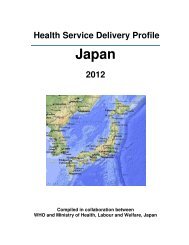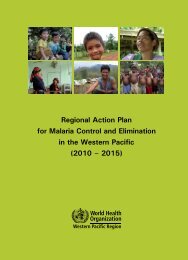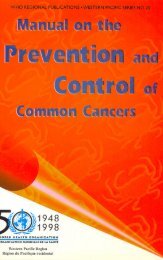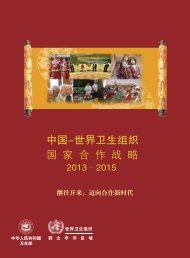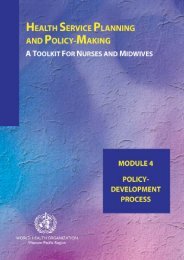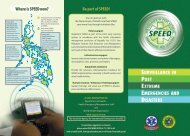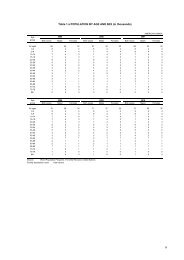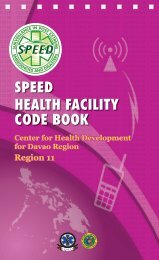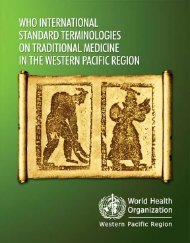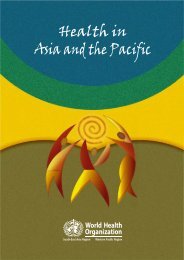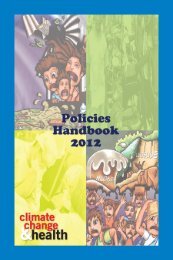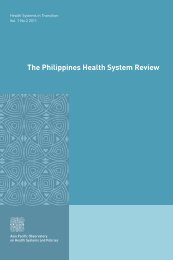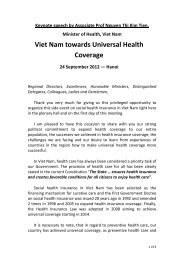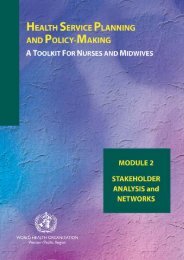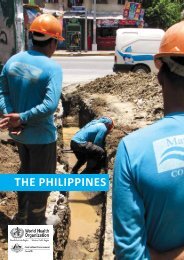Download pdf, 989kb - WHO Western Pacific Region - World Health ...
Download pdf, 989kb - WHO Western Pacific Region - World Health ...
Download pdf, 989kb - WHO Western Pacific Region - World Health ...
You also want an ePaper? Increase the reach of your titles
YUMPU automatically turns print PDFs into web optimized ePapers that Google loves.
A Review of Literature and Projects 2005<br />
the skills to deal with sensitive subjects.<br />
Such situations are lost opportunities<br />
because schools have the resources and<br />
facilities to make educational<br />
programmes work.<br />
(2) Informal (out-of-school)<br />
education<br />
Several other agencies, in both the<br />
government and non-government<br />
sectors, have started programmes to<br />
address adolescent health. These are<br />
carried out through youth activities, the<br />
majority of which are community-based.<br />
Under the AIDS Prevention<br />
Programme, there is a special activity<br />
targeting young people on how to live a<br />
life free from HIV/AIDS using peer<br />
education. Other agencies involved in<br />
developing and implementing training<br />
modules related to adolescent health are<br />
NPFDB, the Muslim Religious Council,<br />
the Malaysian AIDS Council, FFPAM<br />
and other nongovernmental<br />
organizations. Education materials<br />
produced by religious government<br />
agencies do not cover topics related to<br />
sexuality and do not mention sexual<br />
harassment. The products of<br />
nongovernmental organizations are<br />
often more creative and explicit when<br />
compared with those produced by<br />
government agencies. There is concern<br />
about the availability of materials in<br />
multiple languages, including Braille and<br />
sign language, to ensure balanced<br />
coverage for all ethnic groups and the<br />
disabled. Another concern is the training<br />
of teachers, trainers, facilitators and<br />
counsellors to deliver effective sexuality<br />
education.<br />
Several training modules have been<br />
developed for health care workers,<br />
including one on health problems<br />
commonly encountered among<br />
adolescents and how to manage them, a<br />
module focusing on mental health of<br />
young people, and another on<br />
counselling techniques. There is also a<br />
document on standard operating<br />
procedures for managing adolescents’<br />
clinics. More innovative approaches have<br />
been designed for education on sexual<br />
and reproductive health. For example,<br />
the FFPAM has developed the electronic<br />
Reproductive <strong>Health</strong> of Adolescents<br />
Module (e-RHAM), which will enable<br />
wider coverage and a more current mode<br />
of learning.<br />
3.4.2. Services<br />
Adolescents need a wide range of<br />
services, especially health services. While<br />
health care is the core function of the<br />
Ministry of <strong>Health</strong>, other government<br />
agencies also provide health care to<br />
young people. In addition, many<br />
nongovernmental organizations provide<br />
adolescent health services.<br />
49



